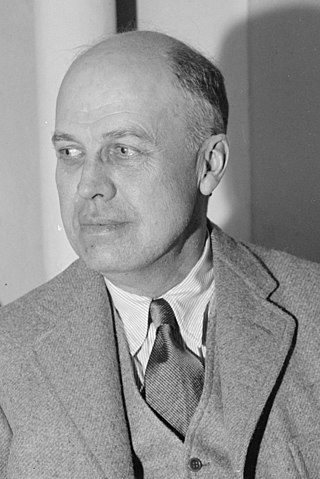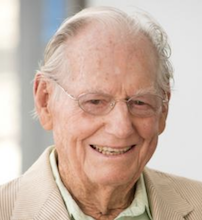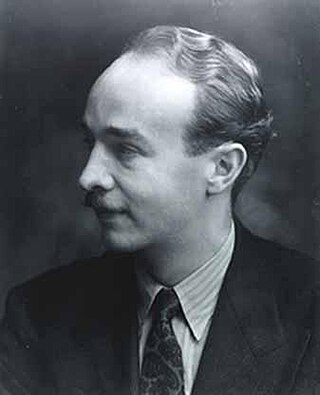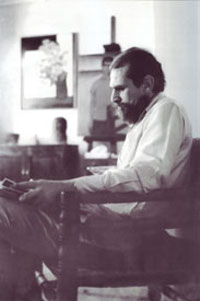
Edward Hopper was an American realist painter and printmaker. He is one of America's most renowned artists and known for his skill in capturing American life and landscapes through his art.

Christie's is a British auction house founded in 1766 by James Christie. Its main premises are on King Street, St James's in London, and it has additional salerooms in New York, Paris, Hong Kong, Milan, Amsterdam, Geneva, Shanghai, and Dubai. It is owned by Groupe Artémis, the holding company of François Pinault. In 2022 Christie's sold US$8.4 billion in art and luxury goods, an all-time high for any auction house. On 15 November 2017, the Salvator Mundi was sold at Christie's in New York for $450 million to Saudi Prince Badr bin Abdullah Al Saud, the highest price ever paid for a painting.

Wayne Thiebaud was an American painter known for his colorful works depicting commonplace objects—pies, cakes, lipsticks, paint cans, ice cream cones, pastries, and hot dogs—as well as for his landscapes and figure paintings. Thiebaud is associated with the pop art movement because of his interest in objects of mass culture, although his early works, executed during the fifties and sixties, slightly predate the works of the classic pop artists. Thiebaud used heavy pigment and exaggerated colors to depict his subjects, and the well-defined shadows characteristic of advertisements were almost always included in his work.

Richard Diebenkorn was an American painter and printmaker. His early work is associated with abstract expressionism and the Bay Area Figurative Movement of the 1950s and 1960s. In the late 1960s he began his extensive series of geometric, lyrical abstract paintings. Known as the Ocean Park paintings, these paintings were instrumental to his achievement of worldwide acclaim. Art critic Michael Kimmelman described Diebenkorn as "one of the premier American painters of the postwar era, whose deeply lyrical abstractions evoked the shimmering light and wide-open spaces of California, where he spent virtually his entire life."

Edward Joseph Ruscha IV is an American artist associated with the pop art movement. He has worked in the media of painting, printmaking, drawing, photography, and film. He is also noted for creating several artist's books. Ruscha lives and works in Culver City, California.

The Pennsylvania Academy of the Fine Arts (PAFA) is a museum and private art school in Philadelphia, Pennsylvania. It was founded in 1805 and is the first and oldest art museum and art school in the United States.

Joseph Rodefer DeCamp was an American painter and educator.

Charles Ephraim Burchfield was an American painter and visionary artist, known for his passionate watercolors of nature scenes and townscapes. The largest collection of Burchfield's paintings, archives and journals are in the collection of the Burchfield Penney Art Center in Buffalo. His paintings are in the collections of more than 109 museums in the USA and have been the subject of exhibitions at the Metropolitan Museum of Art, the Whitney Museum of American Art, the Hammer Museum, and the Museum of Modern Art, as well as other prominent institutions.

Crystal Bridges Museum of American Art is a museum of American art in Bentonville, Arkansas. The museum, founded by Alice Walton and designed by Moshe Safdie, officially opened on 11 November 2011. It offers free public admission.

John Koch, was an American painter and teacher, and an important figure in 20th century Realism. He is best known for his light-filled paintings of urban interiors, often featuring classical allusions, many set in his own Manhattan apartment.

Chop Suey (1929) is an oil painting on canvas by the American artist Edward Hopper. The foreground of the work portrays two women in conversation at a restaurant. In November 2018, it was sold at $92 million, a record price for the artist's work.

Water Lilies is a series of approximately 250 oil paintings by French Impressionist Claude Monet (1840–1926). The paintings depict his flower garden at his home in Giverny, and were the main focus of his artistic production during the last thirty years of his life. Many of the works were painted while Monet suffered from cataracts.
Victor Wendell Ganz (1913–1987) was an American business owner and art collector. He was the president of D. Lisner & Company, a small costume jewelry manufacturer. With limited resources he and his wife Sally Wile-Ganz built one of the most important collections of contemporary art in the 20th century. They became known for their ability to choose art, as "collectors who never made a mistake". Their collection was sold after their deaths in record-setting auctions.

Louay Kayali, was a Syrian modern artist.

Frank Knox Morton Rehn was an American marine painter and president of the Salmagundi Club. Born in Philadelphia, he attended the Pennsylvania Academy of the Fine Arts, where he studied under Christian Schussele. For several years, he then painted portraits in Philadelphia. Using money earned in Philadelphia, he moved to the coast of New Jersey, where he began doing marine paintings. In 1881, he married Margaret Selby. They moved to the Hotel Chelsea in New York City where, with other artists, he kept a studio on the top floor.
Constance Coleman Richardson (1905–2002) was an American painter best known for her American Scene landscapes and interplay of light on figures, evocative of Edward Hopper. She attended Vassar College and Pennsylvania Academy of the Fine Arts and was married to art historian and museum director Edgar Preston Richardson from 1931 until his death in 1985.
Barney A. Ebsworth was an American corporate executive and art collector. He was one of the initial investors in the Build-A-Bear Workshop and was a pioneer in the travel industry. Ebsworth died on April 9, 2018.

Untitled is a painting created by American artist Jean-Michel Basquiat in 1981. The artwork, which depicts a fisherman displaying his catch hanging at the end of a line, sold for $26.4 million at Christie's in November 2012.

The Bootleggers is a 1925 painting by American realist Edward Hopper (1882–1967). The work generally marks the end of his early period before painting the House by the Railroad that same year, the start of his mature or classic period. The painting depicts a nautical scene in a subdued blue and gray palette, showing three men on board a motorboat staring at the shore where another man, standing besides a large house, stares back at them. It has been described and interpreted as Hopper's most overt, political, and even contrarian work.
















